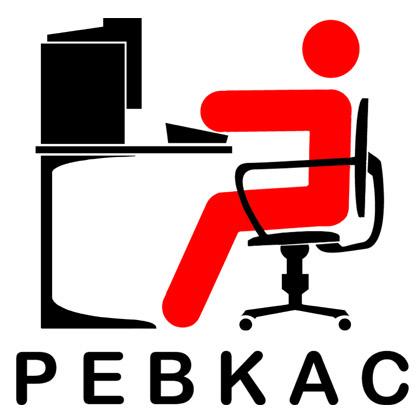Do not use human keyboard
- Transfer

There are several things that annoy me more than when I, against my will, have to take part in creating a habit (or culture) that makes people treat people like computer keyboards. People should not be perceived as buttons that can be pressed to invoke certain functions.
What do I mean by the term "keyboard man"? Imagine for a moment that instead of typing on the keyboard or using the mouse, you would have to ask the person to perform some task.
"Get in my email."
Show me the first message.
"Scroll down a bit."
"Scroll down a little more."
“I want to answer this letter.”
Imagine how such an interface will have a terrible impact on the performance and usability of a computer! For such a simple task as “checking e-mail”, 2 people are required - you and the “person-keyboard”, which will entail double costs, double errors, problems in communication between them. Nevertheless, despite the stupidity of this example, similar situations arise quite often in business, in the interaction between employees who solve and set each other's tasks.
One of the subsets of this problem is when people tell you what needs to be done to solve a problem, instead of telling you what problems your actions should solve. For example, when, say Frank, tells you to “install Postgres on a specific server,” he treats you like a “keyboard man.” He does not inform you about the problems that need to be solved, but talks about the implementation of the chosen solution, which, by the way, may not work. As a result, you have a function that was called, and some kind of result is expected. But what can be the result when you do not know the problem itself and in what context the task was set? Let's ignore in this situation the cases when the input data can be understood correctly in any case, for example, “install this software”, etc.
The social problem caused by treating a person as a keyboard is very interesting. Who is the user in the case described above? Let's say you are a keyboard, and Frank is a user. What happens if the “install Postgres on this server” instruction executes correctly but doesn’t solve Frank's problem? And although, in this case, Frank is between the keyboard (you) and the chair, you can be blamed for his mistakes. This is insulting, and you spend energy searching for the guilty, instead of doing your job normally.
Another example is when a colleague asks you, instead of checking the dashboard of the public internal corporate system used by your “MySQL crashed?” Command. You can answer him by checking the status on the panel yourself instead of him, thereby making it clear to your colleague that you are a “robot notifying about the status of MySQL”. Instead, you should say: “Check the status in the status bar” and give it a link. If you do not have such a system, perhaps you have a page of “questions and answers” and you can link to it.
People are creatures of habit. If you “encourage” the habits of other people, they will persist, and may also spread to your other colleagues. You don’t want to become an interface for obtaining information about the status of MySQL throughout the company? You don’t want to become a “keyboard man”?
You have several options for preventing yourself from becoming a “human keyboard” and decisions will depend on the situation and audience. First, you can document the most frequently asked questions and answers. Secondly, you could (if you have the skills, time, energy) automate answers that cannot be documented, for example, by creating a panel that notifies you of the status of a service or system. Thirdly, if you can’t automate something, then let the requests come through a tracking and application management system (like HelpDesk). Fourth, you can try to teach the user to answer your question without resorting to your help.
If some general requests require a lot of effort to solve them, then the application management system will help you. With its help, you can track the number of such requests and the time taken to solve them. This will help inform the business unit of your group’s employment and estimate the amount of effort you spend and help plan or redistribute the workload.
Often, when the next request is a “keyboard-man” call, it is for sure an annoying request or a simple request from colleagues of techies or a request with a strange solution or a request that they cannot formulate, etc.
Does your company have people who can treat you like a “keyboard man”? Write a FAQ, set the status panel, connect the application management system. As a result, you will experience less stress and make your colleagues and users happier. And the company will have high-quality support, in which most requests are resolved almost instantly.
